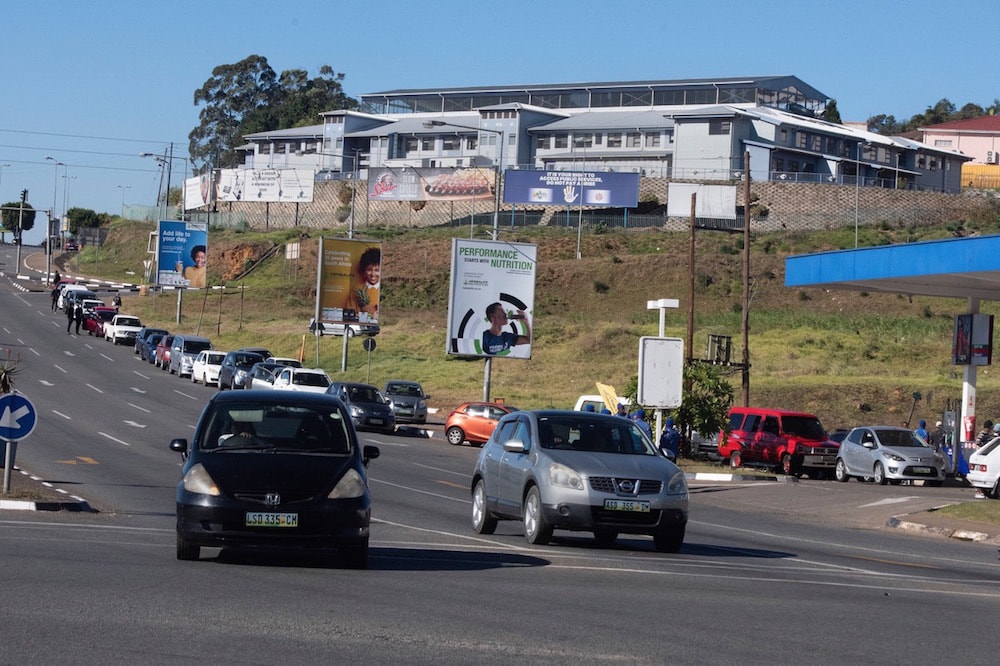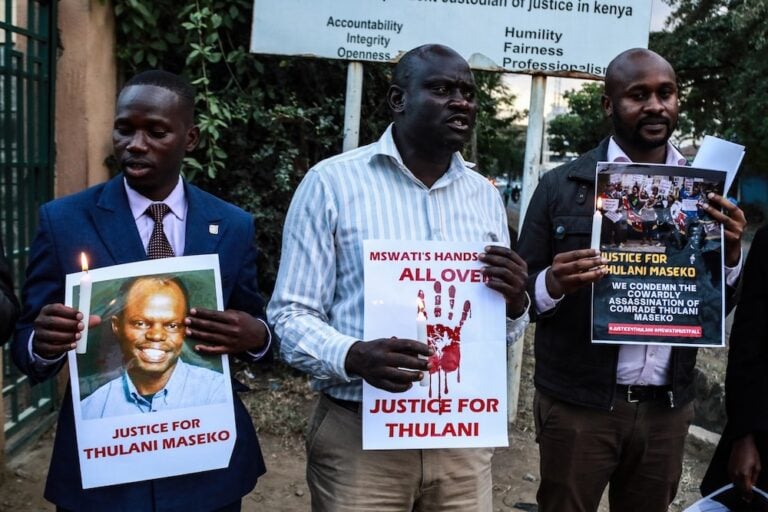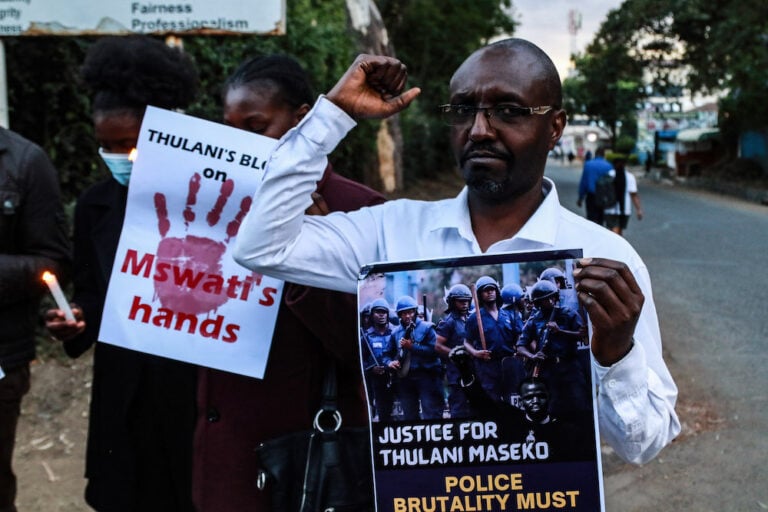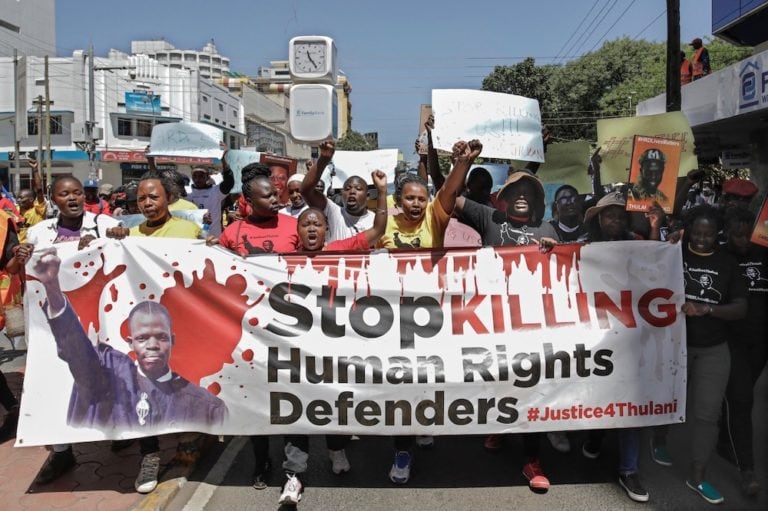"New Frame" journalists Magnificent Mndebele and Cebelihle Mbuyisa were detained, assaulted and forced to delete footage of the funeral of a police shooting victim, which they had just attended.
This statement was originally published on cpj.org on 8 July 2021.
At about 9 a.m. on July 4, soldiers on the MR3 highway near the central town of Matsapha arrested Mndebele and Mbuyisa, both reporters at the nonprofit South African news website New Frame, according to a report and tweets by their outlet, and both journalists, who spoke to CPJ via messaging app.
The soldiers threatened the journalists at gunpoint, seized their cameras, and forced them to delete footage of the funeral of a police shooting victim, which they had just attended, according to those sources.
Soldiers then took Mndebele and Mbuyisa to the nearby Sigodvweni Police Station, where police officers interrogated them about how they entered the country, what kind of coverage they were doing, whom they had spoken with, and the identity of the editor who assigned their coverage, the journalists told CPJ.
In detention, a group of dozens of officers took turns punching and kicking both reporters, squeezed Mndebele’s genitals, hit Mbuyisa with an office paper-puncher, and held plastic bags over both their heads to suffocate them, the journalists said.
Mndebele told CPJ, “We nearly died; it was a traumatic experience.”
They were released at about 3 p.m. after the intervention of a lawyer acting on behalf of New Frame, and they both returned to South Africa the following day, according to the outlet’s report and tweets.
Since June, Eswatini authorities have cracked down on pro-democracy protests in the country, including partially shuttling down the internet, according to news reports.
“Eswatini authorities must thoroughly investigate police officers’ abuse of journalists Magnificent Mndebele and Cebelihle Mbuyisa in detention, and ensure that the officers responsible for such actions are held to account,” said Angela Quintal, CPJ’s Africa program coordinator, in New York. “Instead of harassing, assaulting, and censoring reporters, authorities must allow the press to cover the news safely and without restrictions, so the public can be served by accurate and timely information during this period of turmoil in the kingdom.”
Mndebele and Mbuyisa were treated at a local hospital in Eswatini following their release, they said. Magnificent told CPJ that he sustained a swollen lower back and neck, and injuries on his head and elbow from the beatings. Cebelihle told CPJ that he suffered bruises on his ribs and abdominal area, and pain on his face.
Separately, on June 29, the Eswatini Communications Commission, the government telecommunications regulator, ordered telecom companies to shut down internet access throughout the country as protests against King Mswati III spread nationwide, according to multiple news reports and a statement by the South African telecom company MTN Eswatini, which CPJ reviewed.
Mbongeni Mbingo, chair of the Eswatini Editors Forum, told CPJ via messaging app that the shutdown disrupted many journalists’ work, adding that the state-owned Eswatini Observer and privately owned Times of Eswatini both failed to publish on June 30 and July 1 due to difficulties imposed by the internet shutdown.
On Twitter, New Frame wrote that it was “very difficult to keep in touch with the two journalists as internet communication in the country had been severed.”
Beginning on July 4, authorities allowed website traffic to resume in the country, but continued blocking social media platforms until July 8, when full service was restored, Mbingo said.
Additionally, at least two journalists were injured amid the protests in the country, according to Mbingo and a statement by the Media Institute of Southern Africa, a regional press freedom group.
On June 29, police shot Eswatini Observer reporter Wonderboy Dlamini with a rubber bullet, and the following day, authorities tear-gassed Andile Langwenya, a reporter with the privately owned weekly Independent News, as police attempted to disperse a protest, Mbingo said. CPJ could not immediately determine the extent of either journalist’s injuries.
In a statement, the South African National Editors’ Forum, an industry body of editors and senior journalists, said that South African news organizations, including public broadcaster SABC and independent broadcaster Newzroom Afrika, were forced to pull their journalists out of Eswatini due to concern for their safety.
Eswatini police spokesperson Phindile Vilakati referred all queries to government spokesperson Sabelo Dlamini. In an emailed statement to CPJ yesterday, Dlamini said that the government took the reports about Mndebele and Mbuyisa’s detention and abuse “very seriously,” adding, “we have reached out and requested a meeting with the reporters in question in order to get to the bottom of this matter.”
“We will update the public as we continue to receive further developments in this regard,” he said in the statement, which did not address the other attacks on local journalists.
He also said that the government would meet with journalists whose work was hindered by the internet shutdown, and added that “internet is working as we speak.”
On July 6, CPJ and 20 other press freedom and civil rights organizations wrote an open letter to King Mswati III, urging him to guarantee the safety and security of journalists and media workers and to restore full internet access to the country.



